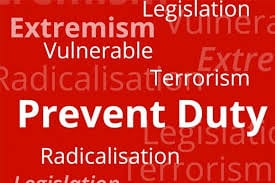By Prof Steven Greer, Professor of Human Rights and Dr Lindsey Bell, Lecturer in Law (University of Bristol Law School).

Of the four ‘Ps’ which frame the UK’s counterterrorist strategy – Pursue, Prepare, Protect and Prevent – the latter is by far the most controversial. It aims to stop people from becoming terrorists, or from supporting those who already are, by countering terrorist ideology and challenging those who promote it (‘counter-radicalization’), steering vulnerable individuals away from it (‘de-radicalization’), and working with sectors and institutions where these risks are considered high. Over 50,000 people and over 2,500 institutions – including schools, universities, mosques, and faith groups – engage with Prevent in over 40 priority areas and over a million people have received relevant training. De-radicalization is coordinated by Channel, an official multi-agency initiative offering non-compulsory, tailor-made support plans based on counselling and encouragement of approved activities, to those willing to receive them. On 22 January 2019 the security minister, Ben Wallace, announced that Prevent would be independently reviewed in accordance with an amendment to the Counter-Terrorism and Security Bill currently wending its way through parliament. This should be welcomed by everyone with an interest in effective, human rights-compliant counterterrorist law and policy and particularly by those, like us, who have long contested the mythology of the anti-Prevent movement. (more…)
 In this post I analyse some of the contradictions present in the current penal response to Covid-19 in England and Wales, represented in a recent Crown Prosecution Service press release. Coercive criminal law measures which clearly and proportionately penalize those who endanger emergency workers, or engage in fraudulent conduct, may be justified. But civil liberties must be considered on both sides. I challenge the punitive narrative which celebrates sending those convicted of coronavirus crimes to prisons where Covid-19 has the potential to be rampant. The rights to life and health of offenders—put at risk in overcrowded prisons—must also be considered. (more…)
In this post I analyse some of the contradictions present in the current penal response to Covid-19 in England and Wales, represented in a recent Crown Prosecution Service press release. Coercive criminal law measures which clearly and proportionately penalize those who endanger emergency workers, or engage in fraudulent conduct, may be justified. But civil liberties must be considered on both sides. I challenge the punitive narrative which celebrates sending those convicted of coronavirus crimes to prisons where Covid-19 has the potential to be rampant. The rights to life and health of offenders—put at risk in overcrowded prisons—must also be considered. (more…)

